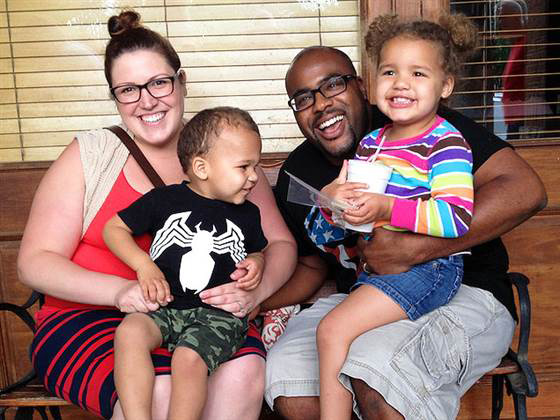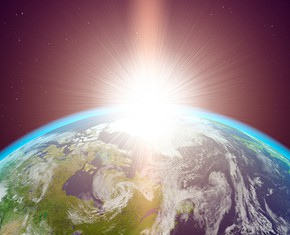The views expressed in our content reflect individual perspectives and do not represent the authoritative views of the Baha'i Faith.
In 1776 Thomas Jefferson, the third President of the United States of America and the architect of the Declaration of Independence, wrote in that venerable document that, “all men are created equal”. More than two centuries later, the United States still desperately struggles to achieve the noble vision of its Founding Fathers.
America’s history is one rooted in slavery and racial division.
The recent killings of young black men in the cities of Ferguson and New York at the hands of white police officers serve for many as harsh reminders of the underlying racial divide that still plagues America. Notwithstanding the significant progress towards racial equality that has been made–after all, Barack Hussein Obama is President–there remains a pervasive ethos of racial inequality perpetuated by the American media at large, and more subtly but far more insidious, by socially accepted and widely used definitions of race.
Beneath the surface of politically correct exchanges, ethnically diverse TV commercials and magazine covers lies an undertone, unmistakable by even the children among us, that whiteness sets the standard by which every other race is measured. It is acceptable in modern day America for a person of mixed ethnic heritage to claim to be Black or to be ethnically mixed; however, under no circumstances can such a person claim to be white, even if he has a white parent. The white race is viewed by society as a pure race, unsullied by mixing with any other racial stock. The notion of a pure race is not only scientifically unfounded but, more importantly, is contrary to the spiritual principle of human equality echoed in the teachings of every divine religion.
Therefore, every man imbued with divine qualities, who reflects heavenly moralities and perfections, who is the expression of ideal and praiseworthy attributes, is, verily, in the image and likeness of God…. Can we apply the test of racial color and say that man of a certain hue — white, black, brown, yellow, red — is the true image of his Creator? We must conclude that color is not the standard and estimate of judgment and that it is of no importance, for color is accidental in nature. The spirit and intelligence of man is essential…. Therefore, be it known that color or race is of no importance. He who is the image and likeness of God, who is the manifestation of the bestowals of God, is acceptable at the threshold of God — whether his color be white, black or brown; it matters not. Man is not man simply because of bodily attributes. The standard of divine measure and judgment is his intelligence and spirit. – Excerpts from a talk given by Abdu’l-Baha at the Fourth Annual Conference of the National Association for the Advancement of Colored People, 30 April 1912, Handel Hall, Chicago, Illinois
We cannot undo the past; we can only expand our awareness sufficiently that we begin to understand intuitively and intellectually that all people indeed belong to one human race.

Interracial families took to tumblr last year after there was a backlash of complaints about a Cheerios commercial which featured an interracial family
Beyond that, as we seek to broaden our concept of race, we need to develop a new language to describe one another. An age characterized by mass travel between continents and expanding populations of ethnically diverse peoples can no longer use such simplistic terms as “white” or “black” to define race. Such racial descriptions have little meaning, and say nothing of substance about who we are in the modern age.
In what category, for example, should we place a child whose mother has white and black heritage and whose father is of Indian heritage? Is this child black, white, or brown? Moreover, the color-coding system currently used in America to define race is, in the minds of many, associated with a period of racial injustice, and, as alluded to earlier, builds on the erroneous notion of a pure race. Today in America many people still think in terms of the white race and the colored race – the colored race being everyone non-white. It seems to completely escape us that white is as much a color as black, brown or red. The United States and many western countries define race as a political-social construct, and not an absolute truth.
The recognition of our common spiritual heritage resides at the core of the Baha’i Faith’s new, unifying vision of race.
Every human being is, as Thomas Jefferson wrote, “created equal” and “endowed by their Creator with inherent and inalienable rights”. Intellectually, many people find it easy to accept this definition; but it often proves far more difficult to remove every subconscious barrier to perceiving this as a self-evident reality. Whether we are of a pale skin tone, of medium brown complexion or a color approaching true black, we are all part of the same race of human beings. The diversity manifested in our skin tones, eye color, hair texture, shapes and sizes is to be celebrated in the same manner that we celebrate diversity in nature and within the animal kingdom.
The past is a part of us, but it need not hinder us from moving forward together as a single race of human beings. Our new language to define race must be one that excludes any phraseology or description that suggests any particular racial identity is superior to or more pure than any other.
The fate of America’s future—and the world’s future–depends upon our ability to unify an increasingly ethnically diverse population. Racial prejudice, whether it finds overt expression in the violence of a police officer, or hides within the private thoughts of a bus driver, represents a societal cancer that we must entirely remove from the body of America.
You May Also Like
Comments

















People for a very long time and wish we as human race could simply stop it! And rise to a new level of consiousness. Im so called white and sick of it! I can't imagine if a person of color or so called color has to hear it daily how they must feel..
that they refused to emancipate and both harbored racist ideas about Africans. It is unlikely that either a 18th century man (Thomas Jefferson)or a 19th century man (Abdul Baha) will have anything important to say about our 21st century problems.
Not too sure where you got the idea that Abdu'l-Baha owned African slaves. Abdu'l-Baha was for the majority of his life a prisoner.
"whether his color be white, black or brown; it matters not." - Abdu'l-Baha
I doubt you had in mind my idea of a new language, as in Zephanniah, when you responded: 'It will, for example, require a new language to record our history, one that provides a more well-rounded view of events and that excludes terminologies that subtly suggest that one ethnic group is inherently superior to any other'
When the time's right consider the Master's take and how his words on 25th April 1912 in D.C. suggest how MUCH is yet to be unearthed about the history you reference so wisely and nicely in your article:
"Therefore the question ...of an auxiliary international language has the utmost importance. Through this means international education and training become possible; the evidence and history of the past can be acquired."
Baha'i love
Paul
Also, it was not my impression that anyone was trying to “judge” Jefferson. For myself, I was trying to say that he is not a very good example of a “noble vision” nor are the other “founding fathers” and just the phrase founding fathers in itself is a denial of the genocide it took to make this country. Also consider that a minimization of history prior to this so called “founding” of America is another denial. Isn’t it time we start to educate ourselves and make some changes in the concepts we promote? Isn’t it time we included everyone in this “noble vision”?
And the “Founding Fathers” that you mention? I am Native American and these men did not found ...my indigenous country. We were here thousands of years before. But I can tell you that these "Founding Fathers" perpetuated and endorsed the genocide of the Native people to near extinction. It is estimated that 30 million Indigenous peoples were murdered under the leadership of the “Founding Fathers”.
We also need to continue looking forward; there is more and more blending across lines of culture and skin tone. That is good. Acknowledging the past is one thing; being stuck in it is quite another.